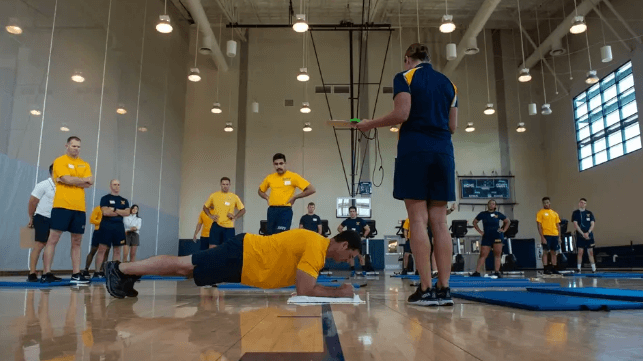U.S. Navy Loosens Physical Fitness Rules, Giving Flexibility to COs

The U.S. Navy has minimum physical fitness standards for its recruits, and active-duty servicemembers and reservists also have to pass regular physical fitness assessments if they want to get promoted or re-enlist. But the service is facing a serious manpower shortage, and it has been adapting its HR policies to the realities of a more competitive employment marketplace. For the first time, the Bureau of Naval Personnel will allow sailors who fail two fitness assessments in a row to stay in the Navy and try again - if their commanding officer agrees.
Under the old system, sailors could fail one fitness assessment and continue in their post. A demerit would be marked in their record, and they would be placed in their command's mandatory physical fitness program. Until they improved their performance, they would be ineligible for a promotion. If they failed a second fitness assessment in a row, they would receive a failing score in the "military bearing" category of their annual evaluation, which would make them ineligible to re-enlist.
The new system is more focused on improvement than on penalties. If a sailor fails a fitness assessment, they are still ineligible for promotion, but the outcome is not marked in their evaluation. If they fail a second assessment, their commanding officer now gets to decide what their score will be on their annual evaluation - and therefore, whether they can stay in the Navy.
Last week, the Chief of Naval Personnel released new guidelines for evaluating sailors with fitness difficulties. The policy asks COs to consider whether the servicemember will be able to perform their job at sea or on shore, given their fitness level; the sailor's contributions to the mission; and the odds that their fitness will improve within a year's time.
"Commanding officers are able to evaluate a sailor’s physical readiness progress or lack of progress in performance evaluations, giving them the ability to manage risk, recognize earnest effort, and best take care of their people," said Vice Adm. Rick Cheeseman, the chief of naval personnel.
The policy emphasizes setting optimum conditions within the command for sailors to stay fit. That includes "healty food, adequate sleep, opportunities to exercise," and access to the outdoors.

that matters most
Get the latest maritime news delivered to your inbox daily.
In a bid to support physical fitness across the fleet, Navy Installations Command is making its gyms and fitness centers available 24 hours a day, seven days a week at all 70 Navy bases around the world. The new standard for access, announced in March, reflects the varying schedule rotations of servicemembers.
"If we require our Sailors to be physically fit and healthy so they can fulfill the Navy mission and deploy at a moment’s notice, then we must provide the facilities and resources for them to do so," said Vice Adm. Scott Gray, commander of Navy Installations Command. "Not only does this make sense, it is the right thing to do for the quality of life of our Sailors and other service members."
